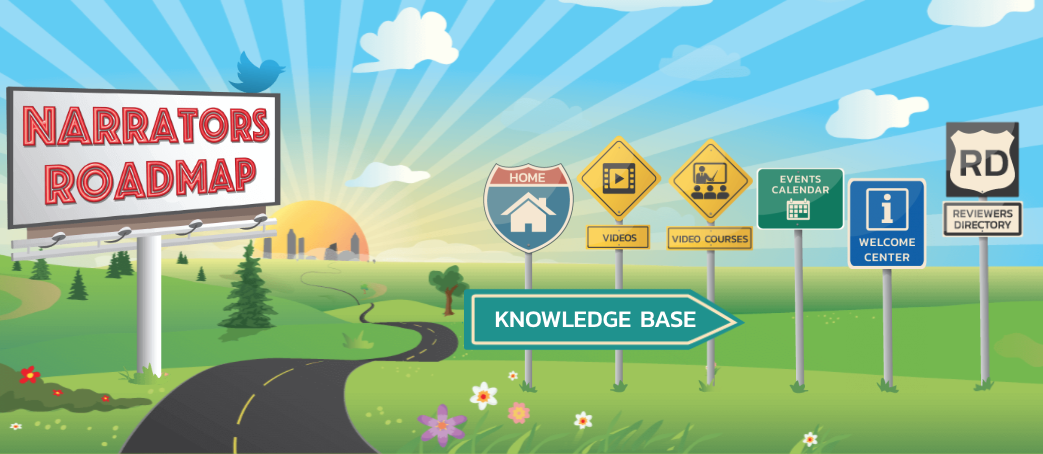In this 4th and final article about my Audiobook Narrator Self-Assessment Quiz, I discuss financial considerations of an audiobook narration business. The post Analyzing the Audiobook Narrator Self-Assessment Quiz Part 4 appeared first on Karen Commins.
Itís finally here! Settle in for the 4th and final article about analyzing the questions on my Audiobook Narrator Self-Assessment Quiz. If youíve missed the previous posts in this series, check out Part 1, Part 2, and Part 3.

†
This time, weíll talk about the Financial Considerations section of the Quiz. I was taught to never discuss money in a job interview until you know you are a good fit for the position. I saved this section until the end for the same reason.
What are your financial expectations?
While itís true that your earnings potential as a narrator rests in part with your drive and determination, itís also true that most new narrators donít make enough money to live off their narration business for an undetermined number of years.
Audiobooks are paid per finished hour (PFH). If your rate is $200 PFH, you would earn $2,000 for a book that runs 10 hours. However, your actual time spent in recording the book will be longer than 10 hours. Refer to this article for a more in-depth explanation about the time needed to produce an audiobook and this one for info about computing your per finished hour rate.
Just because youíre new doesnít mean you should accept rates below $100 PFH. The union minimum on ACX is $250PFH. When you figure your real-time hourly rate, you shouldnít discover youíre charging minimum wage or lower.
Note that you should have some experience before you ever consider declaring yourself a professional audiobook narrator! You may need to do some volunteer work for the blind in addition to gaining audiobook-specific training as I discussed in part 1 of this series.
In order to gain the attention of authors and publishers who actually have decent budgets ó particularly those with SAG/AFTRA agreements (note that union membership qualifies you for other benefits such as health insurance) ó you first need to develop a portfolio of solid titles, by which I mean you should record books in popular genres that have finished times of at least 6-8 hours. You may choose to take some projects on a royalty share (RS) contract in order to gain more experience. †I wrote extensive articles about RS projects here and here.
In addition to possibly taking low-paying and/or speculative work at the start of your career, you should assess what youíre willing to sacrifice in order to pursue this work. I know people who worked a day job, narrated in their off hours, and only slept 3-4 hours for several years. They didnít leave the day job until their narration income could fully support them.
Iím not saying you have to follow suit. Instead, you must realize that your progress probably will be slower than you would like or hope.
If it were easy, everybody would do it.
Have you ever worked as a freelancer?
I probably should have asked this question first! If youíre used to a steady paycheck and benefits like paid sick days, you may be in for a major shock when you become a freelancer.
You can do a Google search and find numerous articles outlining the advantages and disadvantages of being a freelancer. Iíll point out a few of the downsides:
Your workload is uncertain and often can be a feast or famine situation. Many narrators say yes to every project and risk their health because they want to ensure they have money even during the worst dry spells for work. In those cases, personal and/or vacation time often gets pre-empted by a must-do book. Some people canít tolerate the uncertainty about payment and therefore always work at least one other job to maintain their lifestyle. Without the guarantee of money coming in, you may start doing work like lawn or house care that you previously hired another person to do. You also are responsible for all aspects of running your business, including invoicing the clients and making timely tax payments to the IRS. Health care costs, including insurance premiums, continue to rise.Be sure youíre fully aware of the pros and cons to this type of work before you commit to it as your sole job.
Do you have a day job or other monetary cushion to see you through slow times?
Most people starting as audiobook narrators do so on a part-time basis. While a day job limits your availability, it also frees you of the stress and pressure to show an immediate profit while providing other benefits to you. Retirees from other fields who are drawing an annuity also tend to have an easier time starting a second career as an audiobook narrator.
Even the most successful, highly lauded, experienced narrators occasionally have periods of weeks or even months where they donít have work. Itís important to always have contingency and emergency funding sources.
Do you have money set aside for start-up and on-going business costs?
Audiobook narration is a BUSINESS. Like any business, it has start-up and on-going costs, including equipment, software, coaching, internet connection, web site, and marketing materials.
If you donít have enough money on-hand for your business expenses, whether now or in the future, I encourage you to do the empowering exercise described in this article.
How do you feel about constantly networking and marketing yourself to attract and retain clients?
Narrating a book is the reward for doing the REAL job ó regularly informing those who could hire you of your talent, abilities, and availability.
How would you make yourself stand out and be memorable in an already crowded marketplace? Sending email after email may not gain any traction, especially when youíre new to the industry. As I wrote in the last article, publishers hire you only after they decide they can trust you.
One of the surest ways to help people to learn to trust you is to meet them in person. People who live in and around NYC and LA have an advantage in getting to industry events as most of the big audiobook production facilities are located in those 2 cities. The rest of us travel to other cities for conferences, mixers, and workshops. I recommend that you join the Audio Publishers Association to be alerted about member events across the USA.
Obviously, you also should be alert to events occurring in your city. For instance, the American Library Association holds twice-yearly conferences in different cities. Audiobook publishers and producers attend those conferences, so you might be able to connect with your prospects there.
When doing auditions, donít expect to hear back from the casting person unless you get the job.†TV star Bryan Cranston perfectly and succinctly explains this point in this 1:22 video.
Do you have or can you make a dedicated recording space in your home?
You need a dead-quiet space to record a pristine audiobook. Sound isolation and sound proofing materials can be expensive. You may also need to pay for consultations with studio and other technical advisors who can help you achieve an optimum sound for your space.
If you donít have such a space available, you would need to rent studio time and pay an engineer for actual, not finished, hours to record the project. You would need to get rates in your local area in order to create a budget.
†
Now that weíve examined the factors in becoming a successful audiobook narrator, what are your thoughts? Did the quiz help you decide whether to pursue audiobook narration as a career? Did the quiz raise more questions for you? Iíd love to hear from you in a comment below!
The post Analyzing the Audiobook Narrator Self-Assessment Quiz Part 4 appeared first on Karen Commins.





![How to use Ollama and Open WebUI with Docker Compose [Part 4]](https://geshan.com.np/images/ollama-docker-compose/01ollama-docker-compose.jpg)







